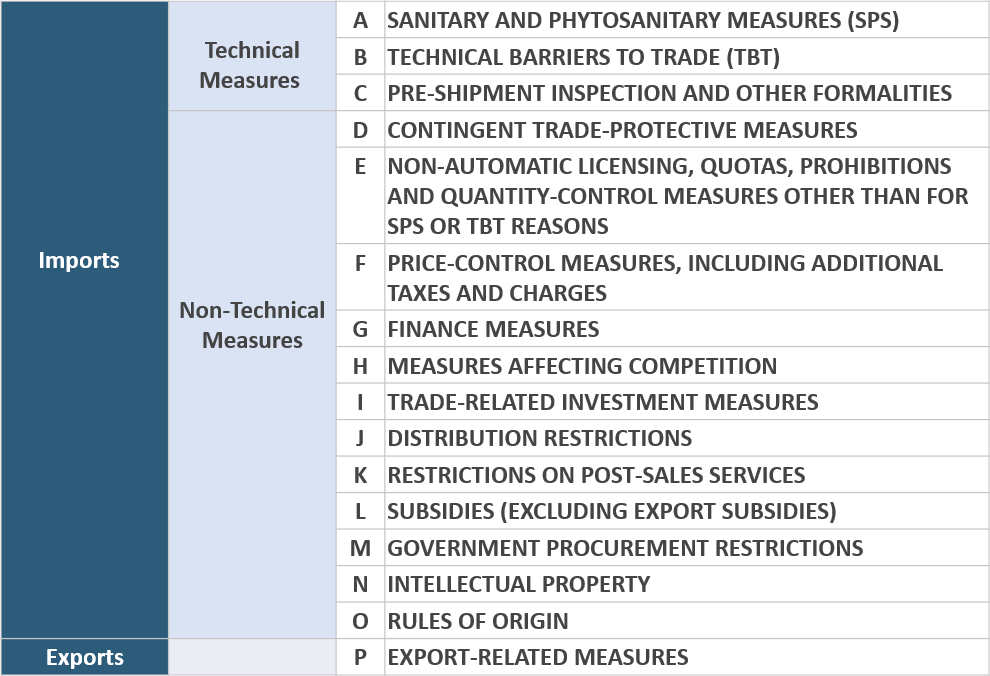
NTMS
 
 TRAINS - One-stop shop for importers/exporters, policymakers, and researchers to access data on trade regulations, Non-Tariff Measures (NTMs), as well as some practical information on target markets.
- Click here to access the website and tutorial to search using TRAINS.
ASEAN Trade Repository (ATR)
Ministry of Finance and Economy- Royal Customs and Excise Department
Ministry of Health - Department of Pharmaceutical Services
Ministry of Primary Resources and Tourism
- Department of Agriculture and Agrifood
- Department of Fisheries
- Forestry Department
Ministry of Religious Affairs
Ministry of Transport and Info-Communication
- Authority for Info-Communications Tecnology Industry (AITI)
Sanitary and phytosanitary (SPS) measures are applied to:
- Protect human or animal life from risks arising from additives, contaminants, toxins or disease-causing organisms in their food;
- Protect human life from plant- or animal-carried diseases;
- Protect animal or plant life from pests, diseases, or disease-causing organisms;
- Prevent or limit other damage to a country from the entry, establishment or spread of pests; and
- Protect bio-diversity.
As clarified in Annex A of the WTO Agreement on the Application of Sanitary and Phytosanitary Measures, SPS measures comprise all relevant laws, decrees, regulations, requirements and procedures including, inter alia: end product criteria; processes and production methods; testing, inspection, certification and approval procedures; quarantine treatments, including relevant requirements associated with the transport of animals or plants, or with the materials necessary for their survival during transport; provisions on relevant statistical methods, sampling procedures and methods of risk assessment; and packaging and labelling requirements directly related to food safety.
SPS measures can be classified into the following sub-categories:
- Prohibitions/restrictions of imports for SPS reasons;
- Tolerance limits for residues and restricted use of substances;
- Labelling, marking and packaging requirements;
- Hygienic requirements;
- Treatment for elimination of plant and animal pests and disease-causing organisms in the final product;
- Other requirements on production or post-production processes;
- Conformity assessment related to SPS; and
- SPS measures not elsewhere specified.
As suggested by the UNCTAD’s 2012 NTM classification and reflected in the classification reproduced in Annex 1, SPS measures are further classified as follows:
- Prohibitions/restrictions of imports for SPS reasons;
- Tolerance limits for residues and restricted use of substances;
- Labelling, marking and packaging requirements;
- Hygienic requirements;
- Treatment for elimination of plant and animal pests and disease-causing organisms in the final product (e.g., post-harvest treatment);
- Other requirements on production or post-production processes;
- Conformity assessment related to SPS; and
- SPS measures not elsewhere specified.
Technical Barriers to Trade (TBT) measures
Standards or mandatory requirements on products characteristics or their related processes or production methods, including technical regulations, testing and certification procedures. Technical barriers to trade (TBT) are measures that include technical regulations and procedures for the assessment of conformity with technical regulations and standards, except for measures that qualify as SPS measures. - Prohibitions/restrictions of imports for objectives set out in the TBT Agreement;
- Tolerance limits for residues and restricted use of substances;
- Labelling, marking, and packaging requirements;
- Production or post-production requirements;
- Product identity requirement;
- Product-quality or -performance requirement;
- Conformity assessment related to TBT; and
- TBT measures not elsewhere specified.
 |
